 Petzlover
Petzlover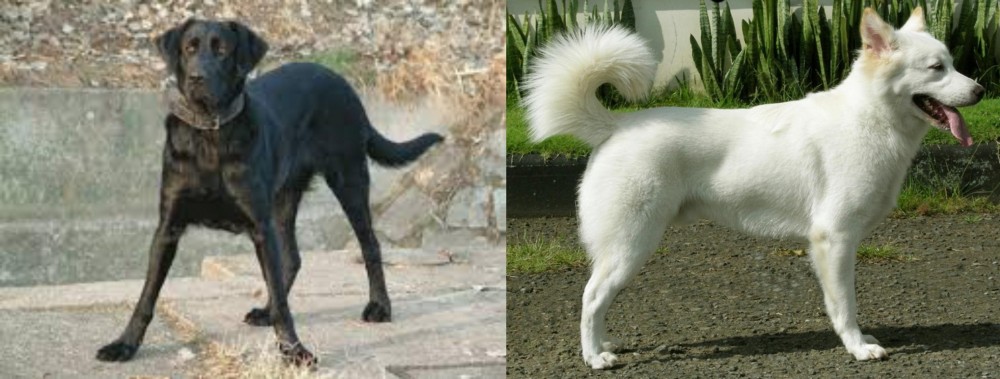 Cao de Castro Laboreiro is originated from Portugal but Kintamani is originated from Indonesia. Both Cao de Castro Laboreiro and Kintamani are having almost same height. Cao de Castro Laboreiro may weigh 53 kg / 117 pounds more than Kintamani. Both Cao de Castro Laboreiro and Kintamani has almost same life span. Both Cao de Castro Laboreiro and Kintamani has same litter size. Both Cao de Castro Laboreiro and Kintamani requires Low Maintenance.
Cao de Castro Laboreiro is originated from Portugal but Kintamani is originated from Indonesia. Both Cao de Castro Laboreiro and Kintamani are having almost same height. Cao de Castro Laboreiro may weigh 53 kg / 117 pounds more than Kintamani. Both Cao de Castro Laboreiro and Kintamani has almost same life span. Both Cao de Castro Laboreiro and Kintamani has same litter size. Both Cao de Castro Laboreiro and Kintamani requires Low Maintenance.
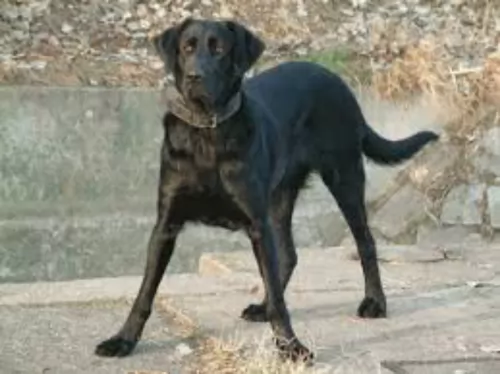 Cão de Castro Laboreiro originates from Portugal. Also known as the Portuguese Cattle Dog he was used long ago to guard livestock. Today, the modern Cao de Castro Laboreiro is descended from the molosser type dog.
Cão de Castro Laboreiro originates from Portugal. Also known as the Portuguese Cattle Dog he was used long ago to guard livestock. Today, the modern Cao de Castro Laboreiro is descended from the molosser type dog.
There are hints to the dog's origins from the 19th century, but changes in agricultural methods meant a disappearance of the dog as a livestock protector. Today the dog is mostly kept as a pet and was first seen at a dog show in 1914.
The Cão de Castro Laboreiro is recognized by the Fédération Cynologique Internationale as well as being recognized by the United Kennel Club in the United States.It is a rare dog and not many exist today but in Portugal, the USA and United Kingdom you will find a few breeders.
 The Kintamani dog is an ancient cross-breed and hails from Bali Island, Indonesia.
The Kintamani dog is an ancient cross-breed and hails from Bali Island, Indonesia.
The beautiful dog is classified into the working dog group.
It isn't sure how the dog developed, and it is believed that local Balinese feral dogs might have had a show in with bring the breed about. There are many stories regarding the origination of this breed but in 2006 the dog got recognition in Bali under the category 'distinct' dog breed.
There are efforts to see the Kintamani dog get global recognition.
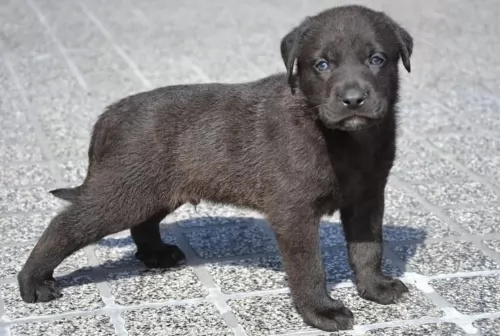 The Cão de Castro Laboreiro is a large dog, with height being in the region of 55 to 60cm and weight being in the region of 45 - 70kg. People describe the dog as wolf-like with a coat that is fairly short, thick and course. The coat is brindle with a base color of shades of grey, chestnut and black.
The Cão de Castro Laboreiro is a large dog, with height being in the region of 55 to 60cm and weight being in the region of 45 - 70kg. People describe the dog as wolf-like with a coat that is fairly short, thick and course. The coat is brindle with a base color of shades of grey, chestnut and black.
This large mastiff-type dog always has a black nose, his tail is long and carried high, but never curling over the back. He has a broad head and is much like the Labrador in looks, being free of wrinkles on the face.The ears of the Cao de Castro Laboreiro are medium-in-size and floppy while the eyes are dark brown.
The Cao de Castro Laboreiro makes an excellent pet as he forms strong bonds with his human family. He is territorial and makes an exceptional guard dog. He doesn’t particularly like strangers and is aloof around them.
This is an intelligent dog breed, he is strong-willed and stubborn, but when he is around the children in the family he is gentle and loving. When he has been trained and socialized, which is always highly recommended with every dog, he gets along with other pets in the home too.
 Looking quite a bit like the Malamute, Chow and Samoyed, the Kintamani is a medium sized dog and has a broad face, erect ears, dark-brown eyes and a thickly plumed tail that is essentially held high.
Looking quite a bit like the Malamute, Chow and Samoyed, the Kintamani is a medium sized dog and has a broad face, erect ears, dark-brown eyes and a thickly plumed tail that is essentially held high.
The Kintamani is a Spitz type dog with an attractive appearance. Standing at 40 to 55cm, the Kintamani weighs in at roughly 13 to 17kg. The colors of the medium to long haired coat are white, beige, black and even brindle, though less common.
Having an independent nature and being territorial, your Kintamani can become aggressive with other dogs. He is very loving and accepting of his human family members though, becoming very loyal to one favorite family member.
They're alert and curious and make good watchdogs. He is also fond of swimming and climbing so he makes a good sport companion.
He is an intelligent dog and he can be easy to train. He is strong-minded and an independent thinker, so training and socialization will rein him in a bit and make him obedient and amicable.
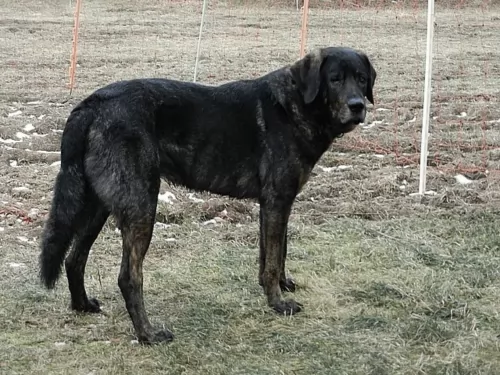 Environment and upbringing have plenty to do with how a dog turns out. People who just buy a dog for guardian purposes and nothing else can’t expect companionship in return.
Environment and upbringing have plenty to do with how a dog turns out. People who just buy a dog for guardian purposes and nothing else can’t expect companionship in return.
The Cão de Castro Laboreiro has always been a fearless guardian of livestock with his strong protective characteristics. He is intelligent and recognizes that a child in the family needs his protection.
This is a large dog who is strong, brave and intelligent but with his human family he is gentle, loving and loyal. Nonetheless he still requires a firm owner, and if you’re fair and firm with him you get the best with him. With this dog you can form a close friendship and bond.
 The Kintamani dog is an alert, bright, intelligent dog who will make you a good watchdog.
The Kintamani dog is an alert, bright, intelligent dog who will make you a good watchdog.
He also makes a companionable pet, and is friendly, loving and loyal to his human family. He has a social, lively temperament, and as people see what awesome pets they make, they are becoming more in demand as they are also easily trainable.
Do your duty towards this attractive dog and love and care for him like any other family member and he’ll be your most devoted best friend.
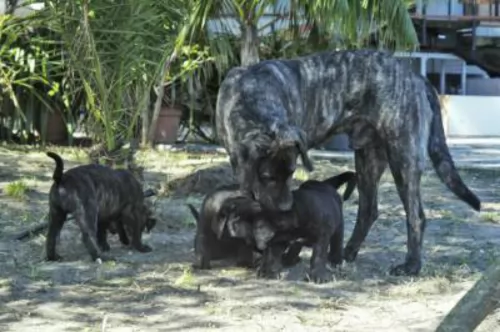 The Cão de Castro Laboreiro is generally a healthy breed, but even so, it is good to be aware of typical canine diseases that your pet may develop.
The Cão de Castro Laboreiro is generally a healthy breed, but even so, it is good to be aware of typical canine diseases that your pet may develop.
There are many eye problems that dogs have to contend with and if you see any kind of ulceration in your dogs eye, get veterinary advice.
A dog should always have access to a shady spot. Never ever leave your dog in a hot car. Heat builds up quickly and death can result soon as the body temperature rises.
Roundworm and tapeworm can infest dogs and you’ll need to speak to your vet about a worming program. Lice, mites and ticks are all parasites which attach themselves to the skin.
 You’re the only one who knows your dog, so you’re the one who will pick up signs that he isn’t well.
You’re the only one who knows your dog, so you’re the one who will pick up signs that he isn’t well.
You can tell a lot from your dog’s behavior, and often a dog that isn’t well will hide away in a corner. If you're worried about your pet’s health, get him to the vet for peace of mind.
Being a responsible dog owner requires you regularly performing body checks on your pet.
The canine parvovirus (CPV) infection is a very contagious viral illness that affects dogs. The intestinal form will have your dog vomiting, he won’t want to eat and he’ll have diarrhea.
The other less common type is the cardiac parvo where the heart muscle of a fetus is attacked, leading in all likelihood to death. Thankfully the incidence of the parvo-virus infection has been reduced by vaccination of puppies.
This is a tick-borne illness that is transmitted through deer ticks. It is a disease more typically seen in dogs from the northeast United States. Common signs of the illness are lameness, lethargy and enlarged lymph nodes. Most dogs respond well to antibiotic treatment.
Take a look inside your dog’s ears and check for itchiness, discharge and redness. Inside the dog’s ears it is very sensitive so if you don’t want to clean his ears, rather leave you vet to do it as you don’t want to perforate your dog’s eardrums.
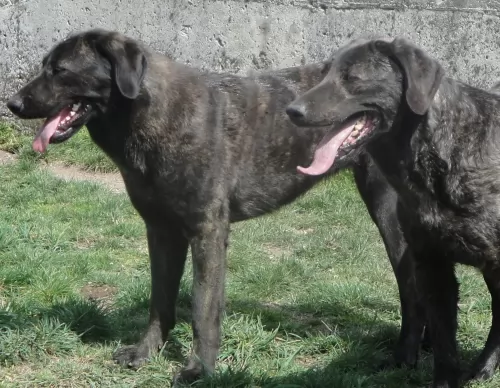 The Cao de Castro Laboreiro has a short coat which requires minimal grooming. Brushing him twice a week to rid him of loose hairs will suffice.
The Cao de Castro Laboreiro has a short coat which requires minimal grooming. Brushing him twice a week to rid him of loose hairs will suffice.
Nail clipping as well as ear- and teeth cleaning are other routine maintenance procedures for your pet.
The food you give your pet must be well-balanced and have protein and carbohydrates. If you want his skin and hair to remain healthy, vitamins, fatty acids and minerals will also be needed.
Boneless chicken and fish, brown rice and vegetables can be a good choice as well as some of the top quality commercially manufactured foods. An active dog will always need a higher protein content and therefore including raw meat into the diet is imperative – not every day as it can be very expensive, but every other day.
Remember that bones can be dangerous as they can splinter and cause your pet internal damage. Fresh, cool water must be available at all times.
 The thick, lustrous coat of the Kintamani will need to be brushed twice a week because the coat is capable of getting burrs in. He sheds, so to keep the coat lustrous you want to be brushing him twice a week to remove all those loose hairs.
The thick, lustrous coat of the Kintamani will need to be brushed twice a week because the coat is capable of getting burrs in. He sheds, so to keep the coat lustrous you want to be brushing him twice a week to remove all those loose hairs.
The dog can adjust to life in the city or the countryside, but being energetic it is best that they have a reasonable sized garden or life on a farm. He will be quite happy with some good walks, but he'll want some more rough and tumble. He just loves joining you on a hike and climbing on rocks. These dogs are actually known for their climbing skills.
Kibble isn’t all equal, and dog owners have a huge choice, with the idea being to find the most nutritious one. Good food is key to good health for your Kintamani.
Your Kintamani puppy will require 4 meals a day. As he reaches adulthood you can start feeding him one or two meals a day.
The Kintamani has a beautiful thick coat and you want to ensure it stays that way by feeding him the best quality food there is. Top-quality dry food from a reputable brand will ensure balanced nutrition.
Read the packaging to ensure you’re giving him food that is appropriate to his age and for medium sized dogs. He will do well on some cooked chicken, brown rice, pasta and vegetables being added to this dry kibble every now and again as a treat.
If you’re unsure about whether he is getting the right kind of food in with a good balance of vitamins and minerals, you can always speak to your vet. Make sure that fresh, cool water is constantly available to him and wash his food and drink bowls regularly.